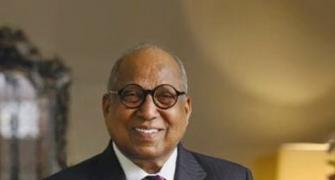 After the Supreme Court cancelled 122 telecom licences in 2012, the telecom sector has seen some correction in tariffs in the last few quarters.
After the Supreme Court cancelled 122 telecom licences in 2012, the telecom sector has seen some correction in tariffs in the last few quarters.
Average realisation per minute has inched up to over 37 paisa a minute from 35 paisa four quarters ago as telcos have started to cut freebies and discounts.
Many hope it will in the next few years get back to the level of 2008 when it was a healthy 50 paisa. Telecom stocks have risen in the expectation of better earnings in the days to come. The spoiler, some analysts say, could be the impending tariff war in data.
As the voice market has matured (and become commoditised), the action is moving to data. Apart from incumbents like Bharti Airtel, Vodafone and Idea Cellular, there will soon be a significant new player in the business.
Mukesh Ambani's cash-rich Reliance Jio that plans to launch fourth-generation, or 4G, services. It is expected to follow a "disruptive" strategy to woo customers.
Before he ceded the telecom business to his brother, Anil, in a family settlement in 2005, Ambani had used a similar strategy in the voice market.
The guiding principle was his father Dhirubhai Ambani's advice that cellular telephony will succeed only if a call was priced below a postcard. With aggressive tariffs, Ambani was able to acquire millions of customers in a matter of months.
Incumbents feel that Reliance Jio can unleash a price war if it wants but it cannot sustain it for too long.
At least that is what they are hoping for. "Reliance Jio can sustain it (low tariffs) for only a few months. Can it sustain it for five years? The answer is no," says a senior executive of one of the country's leading telcos.
"That is because their costs are virtually the same as ours: the network operating costs (50 per cent of the total) are the same. The fibre and tower costs are the same for everyone. The headroom to save costs is limited."
His logic is that most incumbents are selling 2G data packs at a very low price when compared to even voice, and to cut tariff further is not possible.
In many countries, telcos have bundled voice virtually free with data, but in all these cases the tariff is pretty steep - it can go up to as much as $50 a month.
Going beyond 4G
The data market is clearly getting segmented into three categories, based primarily on device costs, with varying usage patterns.
At the bottom of the pyramid are the mass consumers who own a mobile phone that costs Rs 600-700.
They currently contribute 50 per cent of the total data revenue. They consume 2G data in small quantities and the price they pay is very low.
Then there are consumers higher on the value chain who use 3G devices. Their number will expand as the current average device price of Rs 5,000 reduces to around Rs 3,000.
At the top of this pyramid will be 4G users whose numbers will be initially very small but who will consume huge amount of data and thus fetch high revenue to the telcos. Their numbers could grow as device prices fall from Rs 20,000 at present to below Rs 10,000.
Incumbents, on the other hand, say data tariffs need to rise because they are very low and unsustainable. And a move in this direction has already started with 3G data tariffs being raised by 5 to 8 per cent.
On the other end, 4G tariffs have dropped 30 per cent as Bharti Airtel, the lone player in the market currently, wants more consumers to use its service before others join the bandwagon.
Marten Pieters, the CEO of Vodafone, says that 2G data rates will eventually increase because they are very low, while 3G tariffs will soften once more spectrum is made available.
The bulk of the usage is expected to happen in the 3G category. And 4G, in which Vodafone plans to enter only in two metros initially, will be a niche market to begin with. Yet, the impending new battle is being fought in the 4G space.
However, its launch has got delayed (nearly three years since licence was given)- for both Bharti Airtel (which has launched limited operations in a few cities) and Reliance Jio.
The reason was the spectrum the two telcos had bought in the 2300-MHz band has a serious coverage problem.
For deeper penetration into offices and homes, more towers need to be put in place. Bharti Airtel executives say in several cases the coverage has "dark spots" where one has to fall back on 3G.
The problem specific to Reliance Jio, according to sector experts, is that while it can offer voice on 2300 MHz which the policy allows, its technology is still not robust and would require five to six times more towers to be effective.
However, both these problems have now been resolved to a substantial extent with Bharti Airtel as well as Reliance Jio buying spectrum in the 1800 MHz band, part of which can be used for resolving the issue of poor coverage in the 2300 MHz band while offering 4G services.
"The 1800 MHz and the 2300 MHz bands integrated together can offer good 4G coverage to customers, which was not possible earlier," says a telecom executive.
A question of survival
While incumbents hope that Reliance Jio will not unleash a price war, those close to the telco say a disruptive pricing strategy is a must for 4G services as current tariffs are too steep and do not encourage high-volume usage.
The logic is that an average tariff of Rs 1,000 for a 10 GB data pack is very high. By paying so much money, all consumers can download and see are four movies.
That translates into Rs 250 for a movie, which is equivalent to seeing it in the movie theatre.
Many say disruptive pricing is inevitable, especially when a company has no customers but its investments have already been made.
Says a senior executive of a telco which is closely watching Reliance Jio's foray: "It would be suicidal for the company to not play the pricing game and keep the network empty and lose money. If Reliance Jio has a high tariff, customers will not come. When its network is filled 30 to 40 per cent, it will have no choice but to raise tariffs. But that might be after a year."
Surely the next big battle for market share will be fought in data. And while customers could expect tariffs to come down, the party won't continue forever - just like call tariffs.
Gearing up for data play
Vendors working closely with Reliance Jio say that the company is looking at ways to expand the 4G data market.
For instance, mini convertors which you can carry in your pocket would allow any mobile phone with wifi connectivity to get the advantage of high-speed internet.
Thus, customers do not have to buy expensive 4G handsets: all they have to possess is a mobile handset with wifi connectivity. Also the company, in cities like Delhi and Mumbai, is laying a fibre network till the kerb near homes and offices.
"The last mile can be connected through wireless and you can get not only broadband internet but also television which will be of high speed. Eventually, the fibre will be drawn till your home," says a vendor who is privy to the plans.
Competitors admit that if Reliance Jio is able to put this backbone in place, it will open up a whole new market for data but say it will not impinge on their bread-and-butter business of mobile services.
Meanwhile, Reliance Jio is also developing applications to drive usage. Sources in the know say that it could draw content from CNBC-TV18, which it controls, and could even set up an independent news channel for local content or an educational channel (it has already invested in one such venture).
Sources say the company might drive down handset prices by ordering in large volumes. Incumbents warn that subsidising phones could be unwise as earlier such attempts, made many years ago, ended in disaster.
Also, getting these handsets cheap through bulk purchases is a game they too can play.
They argue that building one's own content does not make sense as consumers should be given the choice to choose what they want and the ecosystem already offers them a wide variety of choices.
"You cannot get into the application and content business. There are others who do it better; so you can get into revenue arrangements with them," says a telecom executive.










